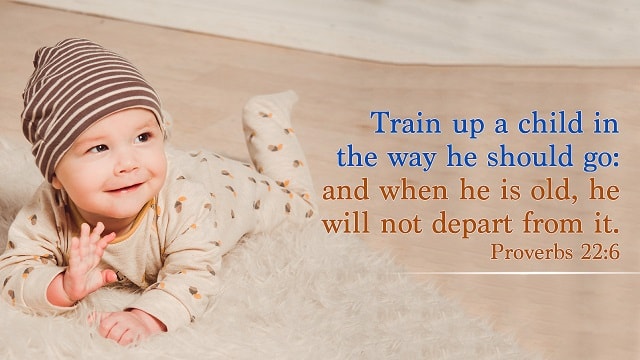10 Bible Verses About Teaching Children

As parents, we expect our children to follow God and walk the right path of life. But because of the temptation of the evil trends of the world, many children stray from God and are harmed by Satan. So, how can we help our children? The Bible tells us clearly that learning God’s word and His ways at an early age will have lifelong benefits. Read the following 10 selected Bible verses about teaching children and some related articles, and you’ll know how to teach your children to walk the right path of life.
Bible Verses for Reference:
Proverbs 22:6
Train up a child in the way he should go: and when he is old, he will not depart from it.
Proverbs 23:13
Withhold not correction from the child: for if you beat him with the rod, he shall not die.
Proverbs 29:15
The rod and reproof give wisdom: but a child left to himself brings his mother to shame.
Leviticus 18:21
And you shall not let any of your seed pass through the fire to Molech, neither shall you profane the name of your God: I am the LORD.
Deuteronomy 6:6–7
And these words, which I command you this day, shall be in your heart: And you shall teach them diligently to your children, and shall talk of them when you sit in your house, and when you walk by the way, and when you lie down, and when you rise up.
Ephesians 6:4
And, you fathers, provoke not your children to wrath: but bring them up in the nurture and admonition of the Lord.
Colossians 3:21
Fathers, provoke not your children to anger, lest they be discouraged.
Psalm 127:3
See, children are an heritage of the LORD: and the fruit of the womb is his reward.
Isaiah 54:13
And all your children shall be taught of the LORD; and great shall be the peace of your children.
1 Timothy 3:4
One that rules well his own house, having his children in subjection with all gravity.
Relevant Words of God:
Besides birth and childrearing, the parents’ responsibility in their children’s lives is simply to provide them with a formal environment to grow up in, for nothing except the predestination of the Creator has a bearing on a person’s fate. No one can control what kind of future a person will have; it is predetermined long in advance, and not even one’s parents can change one’s fate. As far as fate is concerned, everyone is independent, and everyone has their own fate. So, no one’s parents can stave off one’s fate in life or exert the slightest influence on the role one plays in life. It could be said that the family into which one is destined to be born and the environment in which one grows up are nothing more than the preconditions for fulfilling one’s mission in life. They do not in any way determine a person’s fate in life or the kind of destiny within which a person fulfills their mission. And so, no one’s parents can assist one in accomplishing one’s mission in life, and likewise, no one’s relatives can help one assume one’s role in life. How one accomplishes one’s mission and in what kind of living environment one performs one’s role are entirely determined by one’s fate in life. In other words, no other objective conditions can influence a person’s mission, which is predestined by the Creator. All people become mature in the particular environments in which they grow up; then gradually, step by step, they set off down their own roads in life and fulfill the destinies planned for them by the Creator. Naturally, involuntarily, they enter the vast sea of humanity and assume their own posts in life, where they begin to fulfill their responsibilities as created beings for the sake of the Creator’s predestination, for the sake of His sovereignty.
—The Word, Vol. 2. On Knowing God. God Himself, the Unique III





